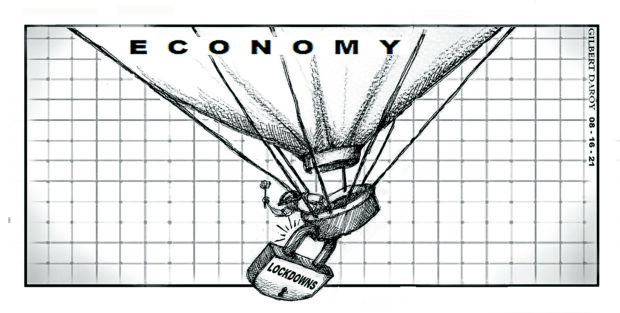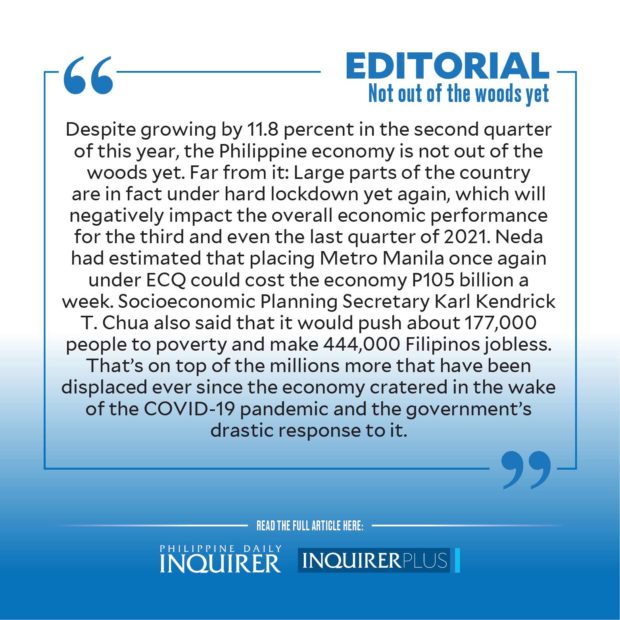Not out of the woods yet

Despite growing by 11.8 percent in the second quarter of this year, the Philippine economy is not out of the woods yet. Far from it: Large parts of the country are in fact under hard lockdown yet again, which will negatively impact the overall economic performance for the third and even the last quarter of 2021.
As economist Solita Monsod explained in her column in this paper last Saturday, the 11.8 percent GDP growth rate is not what it seems: “The growth rate for the second quarter last year was particularly low because that GDP, instead of increasing, decreased by 17 percent. So the base became lower. Now comes this year’s second-quarter GDP. Subtract from it a much lower number, and then divide the difference by the base. And you get a very large growth rate. That’s the base effect… Does that 11.8 percent growth rate, together with the first-quarter growth rate, mean that our GDP is now at least equal to the pre-pandemic numbers? Alas, no…”
The National Economic and Development Authority (Neda) had estimated that placing Metro Manila once again under enhanced community quarantine (ECQ) could cost the economy P105 billion a week. Socioeconomic Planning Secretary Karl Kendrick T. Chua also said that it would push about 177,000 people to poverty and make 444,000 Filipinos jobless. That’s on top of the millions more that have been displaced ever since the economy cratered in the wake of the COVID-19 pandemic and the government’s drastic response to it.
Other observers remain pessimistic about the Philippines’ short-term prospects. “The reimposition of the strictest anti-virus measures in the capital this month — which we reckon is likely to be extended after the initial two weeks—will impinge further on (consumer) spending,” said Pantheon Macroeconomics senior Asia economist Miguel Chanco. DBS economist Chua Han Teng disclosed that the Singapore-based bank has lowered its 2021 economic growth projection for the Philippines to 4.2 percent from 6 percent previously as “the Delta variant does not bode well for domestic demand, amid tighter movement restrictions,” and because “risks that the economy could experience another quarter-on-quarter contraction in the third quarter are rising.”
Capital Economics Asia economist Alex Holmes also noted that GDP in the first half of 2021 was still “around 9-percent below its pre-crisis level and a whopping 17-percent behind its pre-crisis trend.” For Holmes, of most concern was the Delta variant, which is gaining a foothold in the country. “The experience of other countries in the region suggest it will be very hard to contain,” he said.
Further clouding the gloomy outlook are reports that health authorities have suggested an extension of the lockdown to five weeks to better control the virus spread. The private sector was quick to oppose any extension of the debilitating lockdown. The Philippine Chamber of Commerce and Industry (PCCI), the country’s biggest business group, warned that prolonging the ECQ on areas that account for more than half of the economy could only aggravate the health and economic crisis. PCCI acting president Edgardo Lacson pointed out that lockdowns should not be the only option to mitigate the spread of the virus. “The COVID-19 pandemic is a pharmaceutical problem, while lockdown is a militaristic solution. Our economy is disfigured after many protracted lockdowns, yet the spread of COVID-19 continues,” he lamented.
Lacson said the mere mention of lockdown these days stokes greater fear than the infection from COVID-19 itself, and another five weeks of the harsh quarantine measure could be the proverbial last straw on the camel’s back: “It will wipe out the temporary economic gains we’ve earned in between lockdowns and could stop the momentum of business from moving forward.” A more prudent response, he suggested, is to ramp up the vaccination rollout to achieve population protection, and continue the imposition of public health protocols. And if the number of COVID-19 cases would improve this week, Metro Manila should move to modified ECQ; lockdowns should then be granular or limited to small areas where infections remain high.
For former Bangko Sentral deputy governor Diwa Guinigundo, writing in BusinessWorld, the sensible thing to do is for the Philippines to pursue parallel efforts—to neutralize the virus on one hand mainly through the massive vaccination of the population, and grow the economy while it still can on the other. Against the backdrop of the worst economic devastation in the country’s postwar history, “What we would like to see is for both the 2021 and 2022 budgets to be properly disbursed based on the right priorities: health, economy, social services,” Guinigundo stressed. “The preoccupation against drugs and insurgency should be thrown to the back burner.” Is the Duterte administration listening?

















